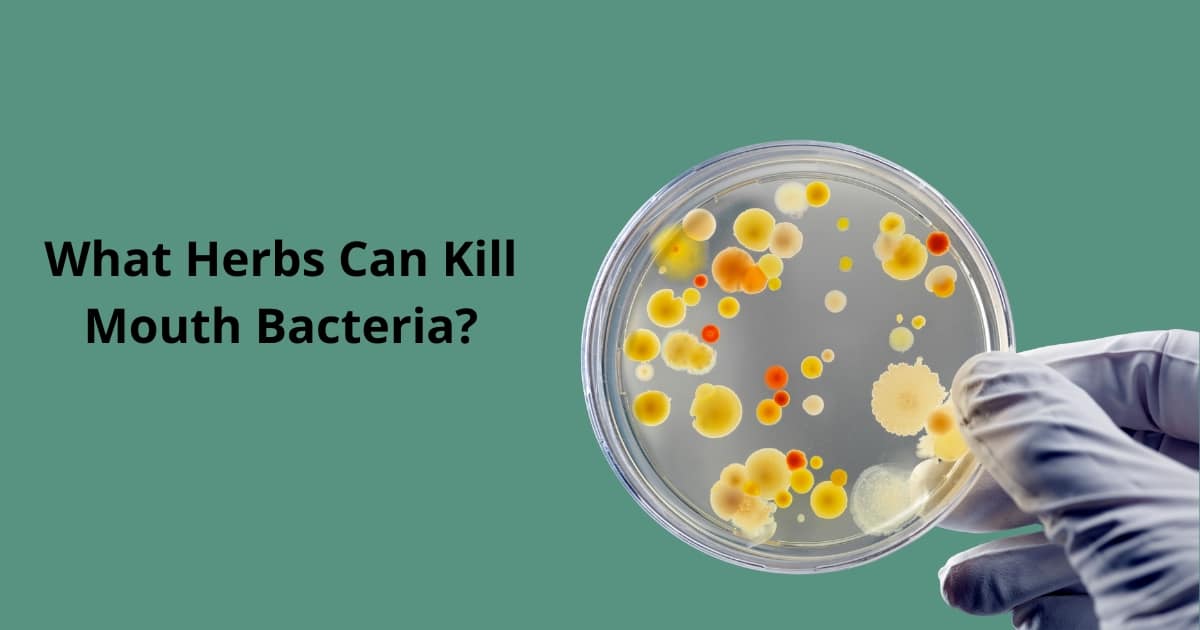Published on September 25, 2024

Ever wonder if there’s a natural way to keep your mouth clean and healthy? You’re not alone.
Many people are turning to herbal remedies to fight off harmful bacteria in the mouth. These natural solutions have been used for centuries and can complement your regular oral hygiene routine.
If you’re curious about which herbs pack the most punch against mouth bacteria, you’re in the right place.
In this blog, we’ll dive into the world of herbs that can help kill mouth bacteria and promote better oral health. From clove to neem, we’ll explore how these powerful plants work and how you can use them effectively.
So, get ready to discover natural ways to boost your oral hygiene and keep those pesky bacteria at bay!
Understanding the Impact of Mouth Bacteria on Oral Health
Mouth bacteria play a significant role in your overall oral health. While some bacteria are beneficial, others can be harmful. These harmful bacteria can wreak havoc in your mouth, leading to serious dental issues.
- Tooth Decay: Harmful bacteria produce acids that erode tooth enamel, leading to cavities.
- Gum Disease: Bacteria can irritate the gums, causing inflammation and leading to gum disease.
- Bad Breath: The presence of certain bacteria contributes to foul odors in the mouth, causing halitosis.
Controlling the balance of bacteria in your mouth is essential. Good oral hygiene practices help keep harmful bacteria at bay. Understanding the types of bacteria in your mouth empowers you to make informed choices about your oral health.
Powerful Herbs to Combat Mouth Bacteria
Several herbs have demonstrated remarkable properties against harmful mouth bacteria. Incorporating these into your oral care routine can enhance your dental health. Here are some standout options:
- Clove: This spice serves as a natural antiseptic and pain reliever, effectively reducing bacteria and soothing toothaches.
- Thyme: Known for its antimicrobial properties, thyme helps maintain healthy gums and fights bacteria responsible for decay.
- Tea Tree Oil: This essential oil fights infection and reduces inflammation, making it a popular choice for oral care.
- Echinacea: Often associated with immune support, echinacea can combat bacteria in the mouth and bolster your defenses.
- Neem: This traditional herb is renowned for its powerful antibacterial effects, making it a favorite in Ayurvedic practices.
- Sage: Used for centuries as a remedy, sage helps alleviate oral infections and freshens breath.
How to Harness the Power of Herbs for Oral Health?
Using these herbs effectively can enhance your oral health routine. Here are some methods to incorporate them into your daily regimen:
- Teas: Brew herbal teas using clove, thyme, or sage. Swish the cooled tea around your mouth for added benefits.
- Mouth Rinses: Create simple herbal mouth rinses with ingredients like tea tree oil or echinacea. Dilute essential oils in water before use.
- Essential Oils: Add a few drops of tea tree or clove oil to your toothbrush before brushing for an extra antibacterial boost.
When using herbs, pay attention to safe dosages and frequency. Most herbal rinses can be used daily, while essential oils should be used sparingly. Regular use of these herbal remedies can complement your traditional oral hygiene practices.
Do Herbal Solutions Deliver Results?
The efficacy of herbal remedies for oral health sparks interest among many. Exploring the science behind these treatments reveals compelling findings:
- Research Studies: Several studies show that herbs like tea tree oil and clove oil significantly reduce oral bacteria and inflammation.
- Herbal and Conventional Combo: Many dental professionals recommend combining herbal treatments with conventional oral hygiene practices, such as brushing and flossing, for optimal results.
Important Precautions When Using Herbs for Dental Care
Using herbs for oral health comes with certain considerations. Awareness can prevent potential issues:
- Allergic Reactions: Some individuals may experience allergies to specific herbs. Conduct a patch test before using a new herb.
- Medication Interactions: Herbal remedies can interact with medications, so it’s crucial to consult your healthcare provider if you’re on prescription drugs.
- Professional Guidance: Always discuss new herbal treatments with your dentist or healthcare provider to ensure they’re safe for your situation.
Natural Strategies to Prevent Oral Bacteria Growth
A few lifestyle changes can significantly influence the balance of bacteria in your mouth. Here’s how to create a healthy oral environment:
- Balanced Diet: Foods rich in fiber, vitamins, and minerals support a healthy mouth. Avoid excessive sugar, which promotes bacterial growth.
- Hydration: Drink plenty of water to keep your mouth moist. Staying hydrated helps wash away food particles and bacteria.
- Oral Hygiene: Regular brushing and flossing remain crucial in controlling bacterial levels. Incorporate herbs as complementary strategies.
When to Consult a Professional for Oral Bacterial Concerns?
While herbal remedies are beneficial, there are times when professional help is necessary. Look for these signs:
- Persistent Symptoms: If you notice prolonged bad breath, pain, or swelling, it might indicate an underlying issue.
- Ineffectiveness of Home Remedies: If herbal treatments fail to provide relief, consult a dentist for further evaluation.
- Regular Check-Ups: Don’t forget the importance of regular dental check-ups. Early detection of problems can prevent severe bacterial infections.
Harnessing the power of herbs offers a natural and effective way to combat harmful mouth bacteria. By incorporating these potent plants into your oral care routine, you can boost your dental health and maintain a vibrant smile. Remember to combine herbal remedies with good hygiene practices for the best results. If issues persist, don’t hesitate to consult a dental professional. Your journey toward a healthier mouth starts today—embrace these herbal solutions and enjoy the benefits they bring!
